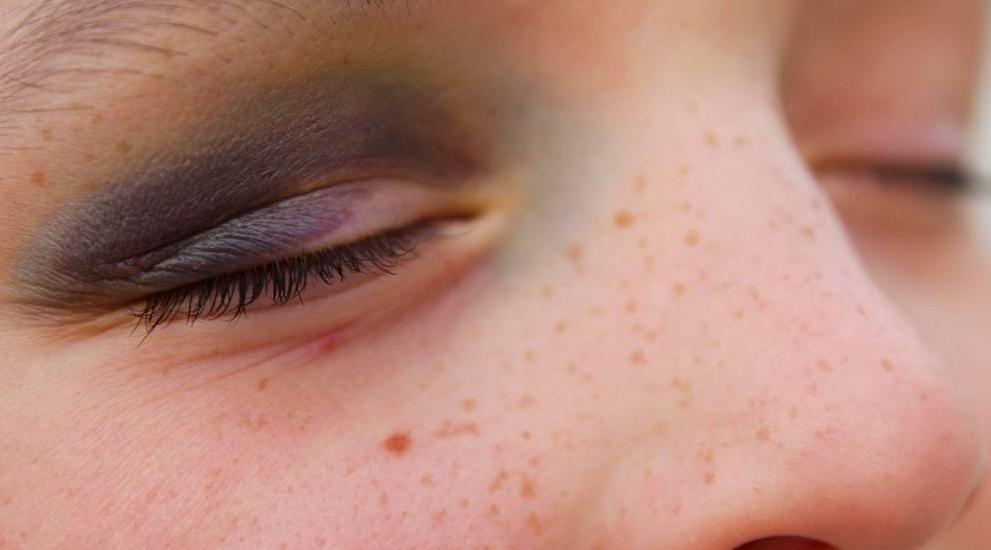Bruise under the eye can occur for a variety of reasons: nose injury, plastic surgery of the eyes or eyelids, allergic reaction, bites, skin or tooth infection, and one of the most common causes is face stubbing. Eye bruise may cause swelling, damaged area, and headaches, and makes vision difficult. Although it looks terrible, it can be quickly healed at home.
Ice compress
The first aid for this is an ice compress. Wrap a handful of ice in a towel – never put ice on the bruise without isolating it or do not rub it into your skin. Add the compress to the swelling area and hold for 10-20 minutes. Repeat the procedure several times a day for the first 48 hours. Ice will reduce swelling and subcutaneous bleeding – the bruise will be smaller and heal faster. An ice compress relieves pain as well.
Warm compress
One to two days after you got a bruise, start making warm compresses. They intensify the blood flow to tissues around the eyes and accelerate healing. Soak a clean piece of cloth in warm water and, after drilling off any excess water, place it on the affected area. Keep until the compress has cooled down. Repeat the procedure several times a day. If not hurt, the affected area can also be gently massaged with a warm compress. It improves blood circulation and removes subcutaneous clots.
Vitamin C
Bruises are positively affected by the additional vitamin C. This vitamin helps to strengthen and thicken the walls of blood vessels, thereby speeding up healing. Eat fruits and vegetables rich in vitamin C: lemons, oranges, cranberries, broccoli, potatoes. If you do not have the ability to change your diet, you can take vitamin C or pure vitamin supplements.
Pineapple and papaya
These fruits are an excellent aid in the treatment of bruises. They are rich in antioxidants that speed up the healing of almost any injury that causes discoloration of the skin. These fruits contain special enzymes that soften and heal the skin. The fruits you may eat, drink their juice or put their pulp as a compress on the affected area – help in all forms.
Witch hazel Hamamelis
In addition to treating bruises on the eyelids, witch hazel Hamamelis can also heal many other ailments. Soak a piece of cotton wool in a decoction or oil of this plant and place it on the affected area for several minutes. The compress will soothe and heal the skin. It is also possible to use a mixture of chamomile oil and chamomile decoction (oil) for compresses. The compresses should be applied two to three times daily.
Mountain arnica
Arnika may reduce the swelling that occurs when the tissue around the eyes is damaged. Arnica ointment or oil also heals muscles and other tissues. The sooner you start taking arnica preparations, the better. Apply grease to the affected area two to three times daily, avoiding any contact with the eyes
Natural oil
Even ordinary oil can help when the eyes are turning violet, but it must be natural and high quality. Simply massage the affected area with oil and the swelling as well as inflammation will be reduced. Remember that the tissues around the eyes are very delicate, so care should be taken when massaging.
Potato
It is not only rich in vitamin C, which strengthens the walls of blood vessels, it also reduces swelling and acts as an analgesic. Peel the potato and cut into thick slices. Cool the slices for half an hour in the refrigerator. Then apply to the affected area for approximately 30 minutes. Potato juice can also be used to make compresses.
It is important to follow certain rules in order to minimize the discomfort and healing of the eye bruise. Clean the affected area and dry thoroughly. This will help prevent bacterial infection. If you have severe pain, take painkillers, but avoid aspirin, which slows down blood clotting. When lying down, try to keep your head above the body level so that blood will not accumulate on the side of the head and the bruise will “walk away” faster. Do not rub or squeeze the affected eye. Also, do not use cosmetics during the first few days until swelling has passed, as it can cause infection.
If, despite all your efforts, your condition worsens – no pain releases, the vision decreases, you feel dizzy, nauseous or even vomiting – see your doctor as soon as possible. These can be signs of serious trauma.
